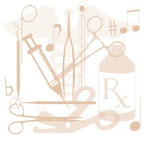
If you've been reading this blog for awhile you know what I advocate different music for the patient from what the surgeon hears. The surgeon needs upbeat, high-energy music that keeps him wide-awake and focused while the patient needs slow, soothing, very steady music that will stabilize his heart-rate and breathing. Today I read a story about a hospital and a surgeon that are utilizing music in the O.R. for the surgeon, through iPods! Enjoy! Dr. Kalpaj Parekh has two loves in his life: surgery and rockin' out to Led Zeppelin.
He considers himself lucky to do both at the same time.
Although "rockin' out" is an exaggeration, music is definitely a fixture for Parekh during surgery. Operating rooms at University Hospitals, along with many other U.S. hospitals, are equipped with sound systems. Surgeons say music relaxes them, focuses their attention, relieves tension and even helps pass the time.
"I think it just relaxes me right away. It takes the pressure off," said Parekh, 38, a cardiothoracic surgeon who operates on the heart and lungs. "It cuts out all the other noise that I don't want to listen to."
Music as a tool in health care is not new. Studies have shown that it helps patients recover after surgery. But research also shows that even surgeons benefit from hearing their favorite tunes. A study done in 1994 by the State University of New York found not only that surgeons performed better with music, but that being able to pick their own music also made them even more proficient.
"I find that when I'm operating it's very visual, and I think the music, in a way, does something to keep the verbal side of my brain busy. It's kind of a strange feeling, (but) maybe it's complementary," said Dr. Grant Hamilton, a University Hospitals' surgeon who does facial plastic and reconstructive surgery on the head and neck.
Surgery can be routine and short or it can be highly stressful and stretch on the entire day. Although very little talking occurs, the murmurs of machines and other extraneous noise are loud enough to make hours seem like days, said Dr. Mark Iannettoni, 49, of University Hospitals.
"There's no talking. Nothing is routine, and there's always a lot of tension," he said. "Music relieves that without making people slack off."
Dr. John Canady, a plastic surgeon known for working on cleft lip and palate, prefers that music blend in as background noise when he operates at University Hospitals.
"Some surgeons don't like to have any background distraction in the OR at all," said Canady, 49. "For me, it depends on the case, the mood I'm in going into the case, how difficult the case will be."
University Hospitals provides a radio sound system in its operating rooms, but in the age of technology, doctors are opting for iPods hooked into speakers. That way they can play their own playlists.
Parekh is happy with classic rock, mostly Led Zeppelin, and in particular "Tangerine" or "The Rain Song." Hamilton listens to music by the decade. Sometimes it's the Eagles' "Hotel California," and at times, every pop song played in the '80s. Iannettoni's tastes run from Dave Matthews to Eminem. Canady prefers light country or classic rock.
Some music is banned from the operating room, although only by the doctor's preferences and out of regard for patients. For personal reasons, Parekh won't play country. Iannettoni thinks heavy metal would be too distracting. Hamilton prefers familiar songs, which keeps him focused on his patient and not on trying to learn the words. Canady refuses to play Barry Manilow.
"When properly used, music can contribute to a patient's safety," Canady said. "A more relaxed ... operating room is a safer one."
While some might find it unsettling to think that surgery could include more than scalpel and suture, surgeons said music is present only to assist, not detract, from their work. Hamilton, recalling one surgeon in his residency that turned the OR into what seemed like a bass-thumping dance hall, said music is usually loud enough to be effective but never so loud that it distracts.
"You can hear it, but we can easily talk and be heard," Hamilton said.
The surgeons said music is common in the operating room and becoming more regular with the younger generation of doctors. Also common, they said, is the seniority that surgeons have to be the real DJs of the medical team.
"Even though surgery is a team approach, it's surgeons who get to pick the music, unfortunately," Parekh said.
 You know, that may sound like a silly question, but I have gotten it and many more like it and it is actually a very logical question. Is there a magical formula for the music that works best during surgery? Believe it or not, there is! And I'm going to give it to you in a general way
The music you already love that is:
You know, that may sound like a silly question, but I have gotten it and many more like it and it is actually a very logical question. Is there a magical formula for the music that works best during surgery? Believe it or not, there is! And I'm going to give it to you in a general way
The music you already love that is:





















